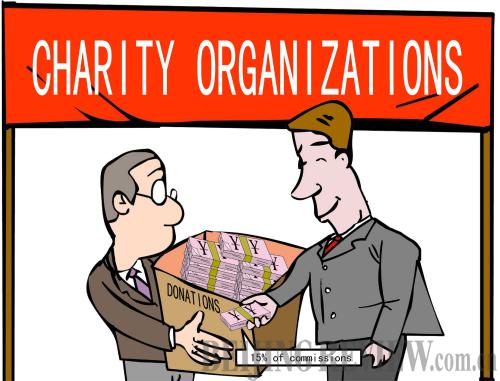|
 |
|
(LI SHIGONG) |
It has been reported that a charity organization named Shilehui in Jinhua, east China's Zhejiang Province, permits its social workers to pocket 15 percent from each charity donation they collect. Twelve social workers of the Web-based charity collected 23.64 million yuan ($3.8 million) in charity funds within four years.
Heated debate ensued on whether charity organizations should give their volunteers kickbacks. Some support the idea, saying that it is reasonable that charity volunteers get some rewards for their work, while many have accused the charity platform of cheating its donors despite a pledge from the organization to use all funds to help those in need. The following are excerpts of some opinions.
She Zongming (Workers' Daily): Although charity is not a business, it also needs financial support. We can't expect social workers to pay all the bills. Therefore, it's an international practice to offer these workers a certain amount of commission.
Material rewards will stimulate social workers' enthusiasm for the work. The main point is that charity organizations should not become profit-oriented organizations. In May 2009, the Chinese Ministry of Civil Affairs made it clear that charity funds are allowed to keep a certain proportion of donation for daily expenses, but the proportion should be kept below 10 percent of the organization's annual expenses on charity programs. Thus, the proportion of 15 percent exceeds the limit. Allured by high kickbacks, charity workers could abuse their work as a channel for making big money.
Zhang Guifeng (Procuratorial Daily): Although from a moral perspective, "unpaid" volunteers are believed to be loftier than "paid" charity workers, we should admit that charity will not necessarily exclude "paid work." In many cases, maintaining a smooth and sustainable operation of certain charity programs requires that workers are paid. After all, collecting donations and subsequently distributing them is a long process. The operation costs money and social workers also need to pay for their own daily expenses. Therefore, to require charity workers to totally neglect personal gains is unrealistic and also unnecessary. It will sometimes hurt the operation of charities.
Long Minfei (Xinhua Daily Telegraph): The typical charity model was typically one operated by volunteers who work for free, but Leshihui changed that traditional structure. People may disagree as to the legitimacy of this model, but it would be improper to rashly forbid it. It is better to give this model enough time, to see if it will ultimately prevail.
Shilehui's sustainable development is made possible by kickbacks from charity funds. In this way, the organization encourages its workers to be more proactive by offering compensation for the time and energy they have contributed, as opposed to the traditional mode. However, unpaid volunteers take on sacrifices by engaging in such charity work. Traditionally, charity workers are required to provide services without expecting to be paid for their contributions. It seems unsustainable for the majority of charity workers.
It is quite reasonable for charity organizations to take part of the donated funds for their daily operating expenses. Paid charity workers suit current social conditions and can also make charity work more professional.
| 